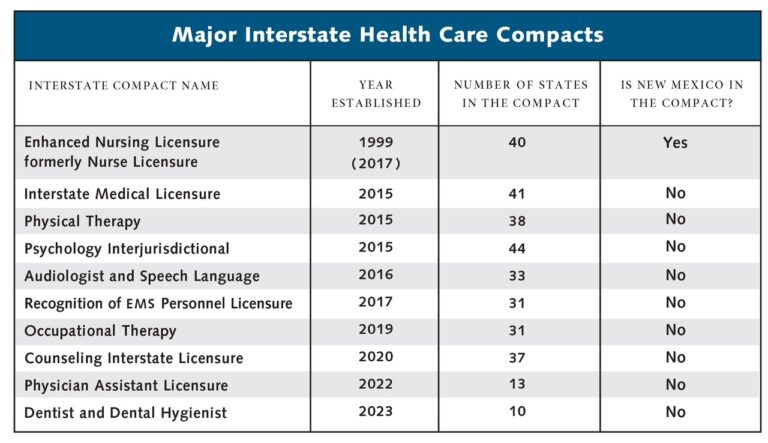Address NM’s Health Care Professional Shortage by Joining Interstate Health Care Compacts

By Alfredo Vigil, MD.
New Mexico has one of the worst doctor shortages in the U.S., and unfortunately it is only expected to get worse. Nearly 40% of New Mexico’s doctors are age 60 or older and will likely retire by 2030, just as the baby boom generation ages and needs much more medical care.
Fortunately, as Think New Mexico explained in our report policy report, How to Solve New Mexico’s Health Care Worker Shortage, there is one policy change that would allow New Mexico to immediately access a much greater supply of doctors: joining the interstate health care compacts.
These interstate compacts are agreements among states to recognize and accept professional licenses issued by other states participating in the compact. Similar to the way that a person can hold a driver’s license from one state and legally drive in another, states that participate in an interstate compacts agree to recognize licenses issued to health care professionals by other states.
Without these agreements, doctors from other states cannot legally provide services in New Mexico – even via telehealth. Every state issues its own medical licenses, and a doctor or other health care professional must be licensed in a state in order to treat patients there.
Forty states, the District of Columbia, and the territory of Guam are parties to the Interstate Medical Licensure Compact, including all five states that border New Mexico. This compact makes it much easier for doctors licensed by any one of those 41 states to practice in the other states.
There are also interstate compacts for psychologists, counselors, physical therapists, audiologists and speech therapists, physician assistants, dentist, and emergency medical personnel.
Unfortunately, New Mexico is not a party to any of those compacts.
Meanwhile, the one compact New Mexico has joined has made a big positive difference. Since 2003, New Mexico has been one of 40 states in the Nurse Licensure Compact, which grants nurses a multistate privilege to practice in other compact states. As many as 80% of the nurses at some New Mexico hospitals, especially in rural and border areas of the state, would not be practicing here but for this compact.
New Mexico is one of only five states that have adopted fewer than two of the 10 interstate health care compacts. By contrast, our closest neighbors have adopted five or more interstate compacts—Arizona: six; Colorado: ten; Oklahoma: eight; Utah: nine; and Texas: five—meaning health care workers can move easily among them.
Interstate compacts include many safeguards to protect patients. For example, with the Interstate Medical Licensure Compact, state medical boards retain final control over the physician licensure process and retain the right to refuse recognition of a license issued by another state. They also have access to a centralized database of disciplinary action records and the authority to require doctors to submit to FBI fingerprint-based criminal background checks.
Legislators of both parties, including Representatives Marian Matthews (D-Albuquerque), Liz Thomson (D-Albuquerque), and Gail Armstrong (R-Magdalena) have introduced legislation to join the compacts, and incoming Senator and former Regulation and Licensing Department Superintendent Linda Trujillo (D-Santa Fe) has said she wants to make it a priority for 2025.
Unfortunately, opponents have defeated these efforts in past years, arguing that allowing health care practitioners licensed by other states to practice in New Mexico would harm state sovereignty. The 48 state legislatures that have adopted at least one interstate health care compact seem to have concluded that the benefits of welcoming more health care providers to their state outweigh any theoretical infringement on state sovereignty.
Think New Mexico recommends that New Mexico sign onto all nine major interstate health care compacts that the state is not yet participating in. This would be an effective strategy to immediately begin to reduce the state’s health care worker shortage by increasing the number of qualified health care professionals who can practice in our state.
We hope all New Mexicans will join us in contacting their legislators and the governor and urging them to make joining the interstate health care compacts a top priority of the 2025 legislative session. Visit our website at www.thinknewmexico.org to learn more and easily contact your elected officials.
Alfredo Vigil, MD. is the Healthcare Reform Director for Think New Mexico.
